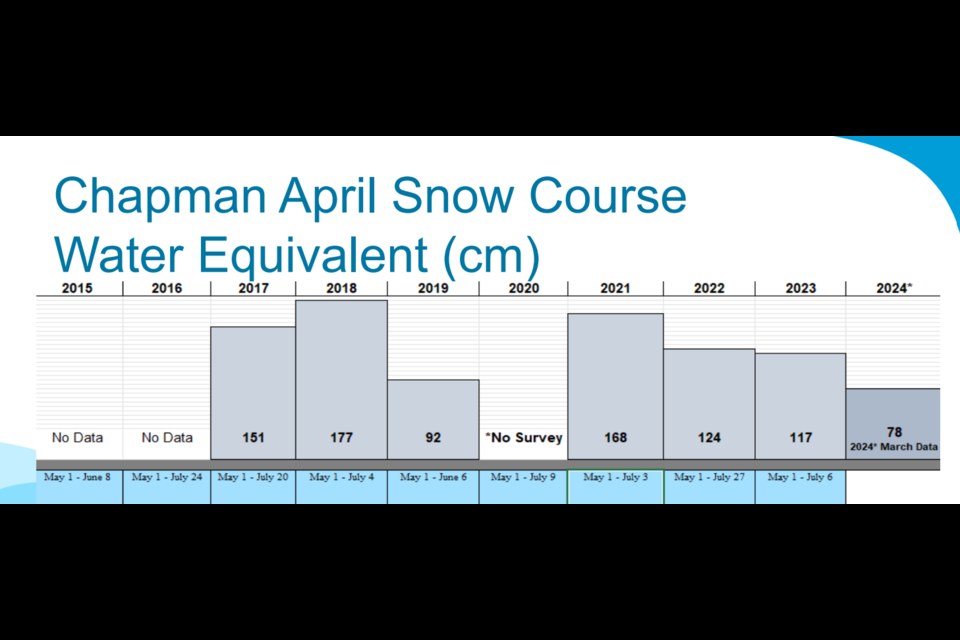Issued a few weeks earlier than in the past, 2024’s first Sunshine Coast Regional District water update highlighted that this year’s lower snowpacks are a factor, but not a major one, for the Sunshine Coast's largest water system.
Infrastructure services manager, Remko Rosenboom, a veteran of local drought conditions and emergencies over the past five years, provided the update at the March 14 committee of the whole meeting.
He reminded elected officials and meeting attendees that the Chapman Water System is “rain dependent." While the level of the snowpack influences water supply in the early spring, which plays a role in when system users are moved to Stage 2 and Stage 3 conservation measures, it is the rain and temperature conditions in June and subsequent months that play the largest roles in the need to invoke Stage 4 (severe) water use rules, he explained.
The update revealed that the snowpack at Chapman Lake increased in the first half of March to 259 cm from a record low of 111 cm recorded at the beginning of the month. The higher depth is still below the average of 287 cm, based on data collected since 1993. Conditions at Edwards Lake were similar, with a bump up from 55 to 170 cm so far in March, which is below the 30-year average snow depth of 199 cm.
Chapman’s snow water equivalent this March is at 78 cm, the lowest level recorded since 2015, according to the update.
Summer outlook for Chapman system
As he detailed the outlook for Chapman system water supply for the remainder of 2024, Rosenboom used a quote from an Environment Canada meteorologist shared during a staff briefing. “Let’s be ready for anything and everything” was the repeated advice he shared with directors. He said Chapman water system supply levels could be negatively impacted by “above average temperatures…dry conditions expected for the BC Coast for March and April… and no clear precipitation trend for May."
Rosenboom said supply supports including the Church Road Well Field and the emergency siphon systems at Chapman and Edwards Lakes. He noted that the permission to operate the siphons when at Stage 4 is in place until late this summer.
How water users can prepare for the dry season
To prepare for the dry season, Rosenboom encouraged SCRD water system users to familiarize themselves with the water restriction rules and the SCRD’s new water update webpage and to sign up for monthly updates on their property’s water use. He admitted that the final suggestion was not a possibility for many SCRD water users in the Sechelt area, as water meter installation in all areas would not be complete until 2026.
Rosenboom also encouraged users to undertake property maintenance tasks that require larger volumes of water, such as washing decks and driveways, before use restrictions are introduced. The SCRD’s bylaws require water systems go to Stage 1 restrictions as of May 1. While the board is informed of restriction start dates and changes, those decisions are based on the advice of staff working in the water utility department.
No 2024 enhancements planned for South Pender system
In response to a question from Area A (Pender Harbour and Egmont) director Leonard Lee, it was noted that improvements for the South Pender Water System supply are not planned for this year. Rosenboom said that in the 2024 budget, approval was given for work to review options to enhance that system’s supply. Options under consideration are the upgrading of the connection linking Harris Lake to the system and the potential to seek changes to the water licenses on McNeill and Harris Lakes.



